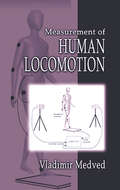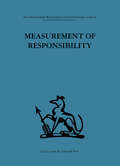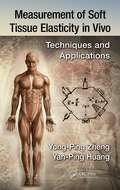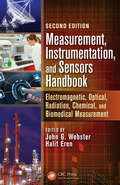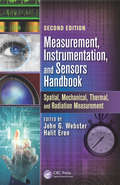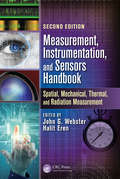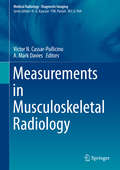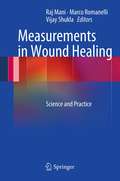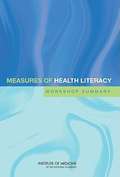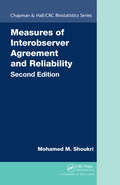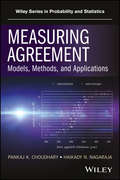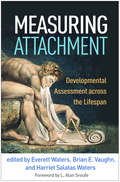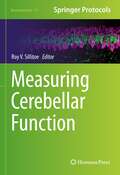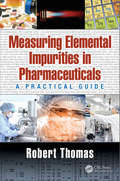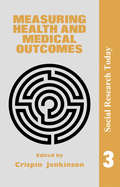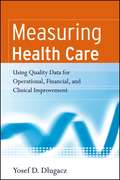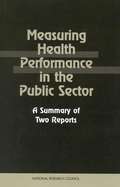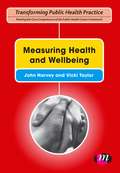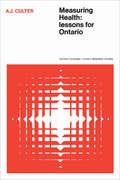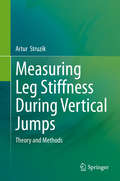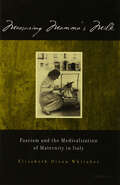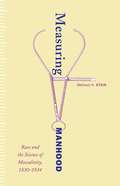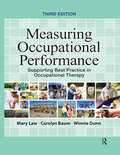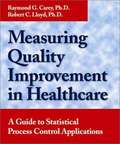- Table View
- List View
Measurement of Human Locomotion
by Vladimir MedvedThe importance of measurements for the proper assessment of human locomotion is increasingly being recognized. The fields of application encompass both healthy and pathological locomotion as encountered in rehabilitation medicine, orthopedics, kinesiology, sports medicine, and the like. Measurement of Human Locomotion provides an up-to-date des
Measurement of Responsibility: A study of work, payment, and individual capacity (International Behavioural And Social Sciences Ser. #Vol. 51)
by Elliott JaquesTavistock Press was established as a co-operative venture between the Tavistock Institute and Routledge & Kegan Paul (RKP) in the 1950s to produce a series of major contributions across the social sciences. This volume is part of a 2001 reissue of a selection of those important works which have since gone out of print, or are difficult to locate. Published by Routledge, 112 volumes in total are being brought together under the name The International Behavioural and Social Sciences Library: Classics from the Tavistock Press. Reproduced here in facsimile, this volume was originally published in 1956 and is available individually. The collection is also available in a number of themed mini-sets of between 5 and 13 volumes, or as a complete collection.
Measurement of Soft Tissue Elasticity in Vivo: Techniques and Applications
by Yan-Ping Huang Yong-Ping ZhengThe product of 20 years of research, this book covers topics in soft tissue elasticity in vivo, from measurement techniques to clinical applications. It provides, for the first time, a single source that systematically introduces the various techniques for in vivo measurement of soft tissue elasticity in an effort to ease the difficulty between lea
Measurement, Instrumentation, and Sensors Handbook: Electromagnetic, Optical, Radiation, Chemical, and Biomedical Measurement (Electrical Engineering Handbook Ser.)
by John G. Webster Halit ErenThe Second Edition of the bestselling Measurement, Instrumentation, and Sensors Handbook brings together all aspects of the design and implementation of measurement, instrumentation, and sensors. Reflecting the current state of the art, it describes the use of instruments and techniques for performing practical measurements in engineering, physics, chemistry, and the life sciences and discusses processing systems, automatic data acquisition, reduction and analysis, operation characteristics, accuracy, errors, calibrations, and the incorporation of standards for control purposes. Organized according to measurement problem, the Electromagnetic, Optical, Radiation, Chemical, and Biomedical Measurement volume of the Second Edition: Contains contributions from field experts, new chapters, and updates to all 98 existing chapters Covers sensors and sensor technology, time and frequency, signal processing, displays and recorders, and optical, medical, biomedical, health, environmental, electrical, electromagnetic, and chemical variables A concise and useful reference for engineers, scientists, academic faculty, students, designers, managers, and industry professionals involved in instrumentation and measurement research and development, Measurement, Instrumentation, and Sensors Handbook, Second Edition: Electromagnetic, Optical, Radiation, Chemical, and Biomedical Measurement provides readers with a greater understanding of advanced applications.
Measurement, Instrumentation, and Sensors Handbook: Spatial, Mechanical, Thermal, and Radiation Measurement (Electrical Engineering Handbook Ser.)
by John G. Webster Halit ErenThe Second Edition of the bestselling Measurement, Instrumentation, and Sensors Handbook brings together all aspects of the design and implementation of measurement, instrumentation, and sensors. Reflecting the current state of the art, it describes the use of instruments and techniques for performing practical measurements in engineering, physics, chemistry, and the life sciences and discusses processing systems, automatic data acquisition, reduction and analysis, operation characteristics, accuracy, errors, calibrations, and the incorporation of standards for control purposes. Organized according to measurement problem, the Spatial, Mechanical, Thermal, and Radiation Measurement volume of the Second Edition: Contains contributions from field experts, new chapters, and updates to all 96 existing chapters Covers instrumentation and measurement concepts, spatial and mechanical variables, displacement, acoustics, flow and spot velocity, radiation, wireless sensors and instrumentation, and control and human factors A concise and useful reference for engineers, scientists, academic faculty, students, designers, managers, and industry professionals involved in instrumentation and measurement research and development, Measurement, Instrumentation, and Sensors Handbook, Second Edition: Spatial, Mechanical, Thermal, and Radiation Measurement provides readers with a greater understanding of advanced applications.
Measurement, Instrumentation, and Sensors Handbook: Two-Volume Set (Electrical Engineering Handbook)
by John G. Webster Halit ErenThis new edition of the bestselling Measurement, Instrumentation, and Sensors Handbook brings together all aspects of the design and implementation of measurement, instrumentation, and sensors. Reflecting the current state of the art, it describes the use of instruments and techniques for performing practical measurements in engineering, physics, chemistry, and the life sciences; explains sensors and the associated hardware and software; and discusses processing systems, automatic data acquisition, reduction and analysis, operation characteristics, accuracy, errors, calibrations, and the incorporation of standards for control purposes. Organized according to measurement problem, the Second Edition: Consists of 2 volumes Features contributions from 240+ field experts Contains 53 new chapters, plus updates to all 194 existing chapters Addresses different ways of making measurements for given variables Emphasizes modern intelligent instruments and techniques, human factors, modern display methods, instrument networks, and virtual instruments Explains modern wireless techniques, sensors, measurements, and applications A concise and useful reference for engineers, scientists, academic faculty, students, designers, managers, and industry professionals involved in instrumentation and measurement research and development, Measurement, Instrumentation, and Sensors Handbook, Second Edition provides readers with a greater understanding of advanced applications.
Measurements in Musculoskeletal Radiology (Medical Radiology)
by A. Mark Davies Victor N. Cassar-PullicinoThis practical, comprehensive book provides succinct and up-to-date information on the value of the various diagnostic radiological measurements made using all the imaging modalities currently employed in the management of a wide spectrum of musculoskeletal disorders. The book has a unique design, with three distinct but dove-tailed sections. All chapters are written by experts in the field, drawn from across Europe, and the book is lavishly illustrated throughout.
Measurements in Wound Healing
by Marco Romanelli Vijay Shukla Raj ManiMeasurement of Wound Healing will update the knowledge base and promote the use of measurements in order to improve both understanding of wounds and their management. This book will feature well used vascular measurements, pathological measurements, imaging measurements and so on. There will be chapters on techniques/measurements that have much promise. This book is led by 3 experienced clinician scientists from different backgrounds who have successfully worked together on projects.
Measures of Health Literacy: Workshop Summary
by Institute of MedicineHealth literacy--the ability for individuals to obtain, process, and understand basic health information and services to facilitate appropriate health decisions--is increasingly recognized as an important facet of health care and health outcomes. Although research on health literacy has grown tremendously in the past decade, there is no widely agreed-upon framework for health literacy as a determinant of health outcomes. Most instruments focus on assessing an individual's health literacy, yet the scope of health literacy reaches far beyond an individual's skills and abilities. Health literacy occurs in the context of the health care system, and therefore measures of health literacy must also assess the demands and complexities of the health care systems with which patients interact. For example, measures are needed to determine how well the system has been organized so that it can be navigated by individuals with different levels of health literacy and how well health organizations are doing at making health information understandable and actionable. To examine what is known about measures of health literacy, the Institute of Medicine convened a workshop. The workshop, summarized in this volume, reviews the current status of measures of health literacy, including those used in the health care setting; discusses possible surrogate measures that might be used to assess health literacy; and explores ways in which health literacy measures can be used to assess patient-centered approaches to care.
Measures of Interobserver Agreement and Reliability (Chapman & Hall/CRC Biostatistics Series)
by Mohamed M. ShoukriMeasures of Interobserver Agreement and Reliability, Second Edition covers important issues related to the design and analysis of reliability and agreement studies. It examines factors affecting the degree of measurement errors in reliability generalization studies and characteristics influencing the process of diagnosing each subject in a reliability study. The book also illustrates the importance of blinding and random selection of subjects.New to the Second Edition New chapter that describes various models for methods comparison studies New chapter on the analysis of reproducibility using the within-subjects coefficient of variation Emphasis on the definition of the subjects’ and raters’ population as well as sample size determination This edition continues to offer guidance on how to run sound reliability and agreement studies in clinical settings and other types of investigations. The author explores two ways of producing one pooled estimate of agreement from several centers: a fixed-effect approach and a random sample of centers using a simple meta-analytic approach. The text includes end-of-chapter exercises as well as downloadable resources of data sets and SAS code.
Measuring Agreement: Models, Methods, and Applications
by Pankaj K. Choudhary Haikady N. NagarajaPresents statistical methodologies for analyzing common types of data from method comparison experiments and illustrates their applications through detailed case studies Measuring Agreement: Models, Methods, and Applications features statistical evaluation of agreement between two or more methods of measurement of a variable with a primary focus on continuous data. The authors view the analysis of method comparison data as a two-step procedure where an adequate model for the data is found, and then inferential techniques are applied for appropriate functions of parameters of the model. The presentation is accessible to a wide audience and provides the necessary technical details and references. In addition, the authors present chapter-length explorations of data from paired measurements designs, repeated measurements designs, and multiple methods; data with covariates; and heteroscedastic, longitudinal, and categorical data. The book also: * Strikes a balance between theory and applications * Presents parametric as well as nonparametric methodologies * Provides a concise introduction to Cohen's kappa coefficient and other measures of agreement for binary and categorical data * Discusses sample size determination for trials on measuring agreement * Contains real-world case studies and exercises throughout * Provides a supplemental website containing the related datasets and R code Measuring Agreement: Models, Methods, and Applications is a resource for statisticians and biostatisticians engaged in data analysis, consultancy, and methodological research. It is a reference for clinical chemists, ecologists, and biomedical and other scientists who deal with development and validation of measurement methods. This book can also serve as a graduate-level text for students in statistics and biostatistics.
Measuring Attachment: Developmental Assessment across the Lifespan
by Everett Waters, Brian E. Vaughn and Harriet Salatas WatersThis volume provides an in-depth examination of traditional and emerging measures of attachment behavior and representations from infancy to adulthood. Leading authorities share their expertise on the Strange Situation, the Attachment Q-set, Ainsworth's Maternal Sensitivity Scales, the Adult Attachment Interview, the Attachment Script Assessments, and the Adult Attachment Projective Picture System, as well as analogue and experimental methods. The book clarifies the conceptual and empirical underpinnings of the various measures and shows how they fit into a coherent developmental framework. Offering detailed discussions of key constructs such as attachment security, the secure base phenomenon, disorganization, and narrative structure, this is a valuable resource for both researchers and practitioners who use attachment assessments in their work.
Measuring Cerebellar Function (Neuromethods #177)
by Roy V. SillitoeThis volume considers the current techniques used by experts to study and measure cerebellar function. The chapters in this book cover topics such as stem cell-based techniques; conditional genetics approaches in model systems; neuronal recordings conducted in vitro and in vivo; and an ever-growing list of behavioral paradigms. This book also provides readers with a guide for how to use tools such as iPSCs and how to address questions using a range of approaches in animal model systems including mouse, rat, zebrafish, and non-human primate. In the Neuromethods series style, the chapters include the kind of detail and key advice from the specialists needed to get successful results in your laboratory.Cutting-edge and authoritative, Measuring Cerebellar Function is a valuable resource for cerebellar enthusiasts and other scientists interested in learning more about the cerebellum and the technological advances that are currently being employed to unlock brain function and understand animal behavior.
Measuring Efficiency in Health Care
by Rowena JacobsWith the healthcare sector accounting for a sizeable proportion of national expenditures, the pursuit of efficiency has become a central objective of policymakers within most health systems. However, the analysis and measurement of efficiency is a complex undertaking, not least due to the multiple objectives of health care organizations and the many gaps in information systems. In response to this complexity, research in organizational efficiency analysis has flourished. This 2006 book examines some of the most important techniques currently available to measure the efficiency of systems and organizations, including data envelopment analysis and stochastic frontier analysis, and also presents some promising new methodological approaches. Such techniques offer the prospect of many new and fruitful insights into health care performance. Nevertheless, they also pose many practical and methodological challenges. This is an important critical assessment of the strengths and limitations of efficiency analysis applied to health and health care.
Measuring Elemental Impurities in Pharmaceuticals: A Practical Guide (Practical Spectroscopy)
by Robert ThomasRecent regulations on heavy metal testing have required the pharmaceutical industry to monitor a suite of elemental impurities in pharmaceutical raw materials, drug products and dietary supplements. These new directives s are described in the new United States Pharmacopeia (USP) Chapters , , and , together with Q3D, Step 4 guidelines for elemental impurities, drafted by the ICH (International Conference on Harmonization of Technical Requirements for Registration of Pharmaceuticals for Human Use), a consortium of global pharmaceutical associations, including the European Pharmacopeia (Ph.Eur.), the Japanese Pharmacopeia (JP) and the USP. This book provides a complete guide to the analytical methodology, instrumental techniques and sample preparation procedures used for measuring elemental impurities in pharmaceutical and nutraceutical materials. It offers readers the tools to better understand plasma spectrochemistry to optimize detection capability for the full suite of elemental PDE (Permitted Daily Exposure) levels in the various drug delivery categories. Other relevant information covered in the book includes: The complete guide to measuring elemental impurities in pharmaceutical and nutraceutical materials. Covers heavy metals testing in the pharmaceutical industry from an historical perspective. Gives an overview of current USP Chapters and and ICH Q3D Step 4 Guidelines. Explains the purpose of validation protocols used in Chapter , including how J-values are calculated Describes fundamental principles and practical capabilities of ICP-MS and ICP-OES. Offers guidelines about the optimum strategy for risk assessment Provides tips on how best to prepare and present your data for regulatory inspection. An indispensable resource, the fundamental principles and practical benefits of ICP-OES and ICP-MS are covered in a reader-friendly format that a novice, who is carrying out elemental impurities testing in the pharmaceutical and nutraceutical communities, will find easy to understand.
Measuring Health And Medical Outcomes
by Crispin JenkinsonA clear analysis of the design, potential uses and limitations of questionnaires in measuring health from the perspective of the patient. Practical examples illustrate the methodological issues and guide the reader through good and bad practice. The book will appeal to academics, postgraduates and advanced undergraduates in medical sociology, health economics, social/health psychology, public health and epidemiology. It will also be extremely helpful to social science researchers outside these areas who have an interest in the use of questionnaires in an applied field.; "Social research today" is a forthcoming series of books devoted to the illumination of significant methodological topics in the social sciences and professional social research. The structure of social inquiry combines two separate elements: empirical evidence and organizing ideas and theories. Both are necessary for successful social understanding; one without the other is barren. This series will be concerned with the means by which this structure is maintained and kept standing and upright. The books in the series are intended for undergraduates in the social sciences, postgraduate students undergoing research training, and those undertaking social research of whatever kind. Broadly conceived, research methodology refers to the general grounds for the validity of social science propositions. How do we know what we do know about the social world? More narrowly, it deals with questions such as h.; This book is intended for academics, postgraduates and advanced undergraduates within medical sociology, health economics, social/health psychology, public healthand epidemiology. Social science researchers with an interest in theuse of questionnaires in an applied field.
Measuring Health Care
by Yosef D. DlugaczThis invaluable guide shows students and professionals how measurements and data can be used to balance quality services and financial viability and how measures can help to evaluate and improve organizational, clinical, and financial processes. The book explains the various performance measurement methods used in health care and shows their practical impact on clinical patient outcomes.
Measuring Health Performance in the Public Sector: A Summary of Two Reports
by Panel on Performance Measures Data for Public Health Performance Partnership GrantsThe National Academies Press (NAP)--publisher for the National Academies--publishes more than 200 books a year offering the most authoritative views, definitive information, and groundbreaking recommendations on a wide range of topics in science, engineering, and health. Our books are unique in that they are authored by the nation's leading experts in every scientific field.
Measuring Health and Wellbeing (Transforming Public Health Practice Series)
by John Harvey Vicki TaylorBuilding on the core competences for public health, this book focuses on key areas of surveillance and assessment of the population′s health and wellbeing. It is concerned with assessing and describing the needs, health and wellbeing of specific populations, communities and groups. The authors also look at how to monitor these aspects of public health and explore qualitative and quantitative methods for measuring, analysing and interpreting health and wellbeing, needs and outcomes. Case studies, activities and research summaries are used throughout the book to help the reader understand how to apply theory to practice.
Measuring Health: Lessons for Ontario
by Anthony CulyerPlanning and evaluating any health care program is a formidable task: how do you measure the health of a population? This fundamental question has been approached from various perspectives in medical, administrative, and economic studies. This book provides a guide to health measurement literature and relates it to Ontario's current and prospective policy choices and to the federal context of health indicators and indices to existing statistics in Ontario in a county-by-county survey of the province's health care. He also outlines the kinds of information essential to health assessment but not currently available. The book as a whole emphasizes the importance of health care measurement in the humane and efficient planning of health services. It will be of interest to all concerned with the practice of medicine in the 1980s and the planning of health services at the federal and provincial levels, as well as to those with a special interest in health from the economic, political, and sociological perspectives.
Measuring Leg Stiffness During Vertical Jumps: Theory and Methods
by Artur StruzikThis book presents a thorough description and critical discussion of different approaches to measuring leg stiffness during vertical jumps, as well as practical applications. Various topics covered include the applicability of the spring-mass (linear) model of the human motion system, leg stiffness controversies and interpretations, and computational and measuring methods of leg stiffness during vertical jumps. Additionally, a description of a research project performed expressly for inclusion in this book is given; the study aims to determine normative values for leg stiffness for young, healthy, non-athletes during single vertical jumps to maximal and specific heights. A final chapter covers additional perspectives, enabling the reader to acquire different perspectives on measuring leg stiffness during vertical jumps across a breadth of information and interpretations.Measuring Leg Stiffness During Vertical Jumps: Theory and Methods is an ideal book for researchers and practitioners in the fields of biomedical engineering, biomechanics, and sport sciences.
Measuring Mamma's Milk: Fascism and the Medicalization of Maternity in Italy
by Elizabeth Dixon WhitakerIn Italy as in other Western societies, the medicalization of basic biological functions contributes to the loss of personal confidence in the care of the body. Measuring Mamma's Milk analyzes the medicalization of maternity through a study of breastfeeding practices over a century of changes in socioeconomic organization, family life, and health beliefs. During the pivotal interwar period in Italy, fascism changed the relationship between the state and the public and greatly tightened the state's ties with medicine and science. "Rationalized" breastfeeding was at the heart of programs to reduce infant mortality rates in order to increase the size and "quality" of the population. Highly regimented feeding schedules, still practiced today, came to represent both an eternal, natural function and the conquest of fatal maternal ignorance by modern science. They also had important consequences for fertility and for maternal and child health. Through an interdisciplinary approach, Elizabeth Whitaker shows how fascism went beneath the surface to have a lasting impact on cultural beliefs and behaviors. Measuring Mamma's Milk will appeal to readers interested in Italy, fascism, and the care of young children as well as to scholars in medical and cultural anthropology, European history, history of medicine, and women's studies. Elizabeth Dixon Whitaker received her Ph.D. in anthropology from Emory University. She is the recipient of two Fulbright grants, the second of which sent her to the University of Bologna as a Senior Scholar in 1998-99. She is currently an independent scholar living in Washington, D.C.
Measuring Manhood: Race and the Science of Masculinity, 1830–1934
by Melissa N. SteinFrom the &“gay gene&” to the &“female brain&” and African American students&’ insufficient &“hereditary background&” for higher education, arguments about a biological basis for human difference have reemerged in the twenty-first century. Measuring Manhood shows where they got their start.Melissa N. Stein analyzes how race became the purview of science in nineteenth- and early twentieth-century America and how it was constructed as a biological phenomenon with far-reaching social, cultural, and political resonances. She tells of scientific &“experts&” who advised the nation on its most pressing issues and exposes their use of gender and sex differences to conceptualize or buttress their claims about racial difference. Stein examines the works of scientists and scholars from medicine, biology, ethnology, and other fields to trace how their conclusions about human difference did no less than to legitimize sociopolitical hierarchy in the United States.Covering a wide range of historical actors from Samuel Morton, the infamous collector and measurer of skulls in the 1830s, to NAACP leader and antilynching activist Walter White in the 1930s, this book reveals the role of gender, sex, and sexuality in the scientific making?and unmaking?of race.
Measuring Occupational Performance: Supporting Best Practice in Occupational Therapy
by Mary Law Winnie Dunn Carolyn M. BaumAs the profession of occupational therapy continues to mature and expand its practice, the measurement of occupational performance is one of the key avenues that all practicing clinicians will need to explore and master. Measuring Occupational Performance: Supporting Best Practice in Occupational Therapy, Third Edition summarizes the measurement tools needed to assess client occupational performance, to provide the best intervention, and to document the effectiveness of that intervention. These measurement tools are not just a compilation of all that are available for measurement relevant to occupational therapy; they are an elite group of tools carefully selected by the editors through a process of rigorous theoretical, clinical, and scientific reasoning. In this Third Edition, Drs. Mary Law, Carolyn Baum, and Winnie Dunn have updated current chapters and added new topics that have not been covered in past editions, such as a chapter on measuring school performance, a key area of practice. Also included is a chapter on measurement principles and development to highlight the concepts common to all the measures included in the text. The Third Edition also has a focus on the best measures and measures that are used most frequently.Features of the Third Edition:Offers insight into the importance of measuring functional performance, methodologies, measurement issues, and best approach for outcome measurement Conveys a broad focus on occupational performance and offers examples from a wide range of practice settings and from multiple spots throughout the lifespan Explains the technical aspects of measurement development and methodologies and which components of functioning are to be measured and how Develops an understanding of the theoretical aspects and evidence for both standardized tests and non-standardized tests Instructors in educational settings can visit www.efacultylounge.com for additional material to be used for teaching in the classroom.New in the Third Edition: Focus on strengths-based approaches Measures health and disability at both individual and population levels using the International Classification of Functioning, Disability and Health (ICF) An emphasis on evidence-based practice and using evidence from other disciplines, not just from occupational therapy New chapter focused on school-based practice New content on reliability, validity, and responsiveness New content on goal attainment Additional material on decision making in practice In this changing health care environment, Measuring Occupational Performance: Supporting Best Practice in Occupational Therapy, Third Edition explains how core values and beliefs can be put into everyday practice and is the essential reference manual for the evidence-based occupational therapy and occupational therapy assistant student and practitioner.
Measuring Quality Improvement In Healthcare: A Guide To Statistical Process Control Applications
by Raymond G. Carey Robert C. LloydThis ground-breaking book addresses the critical, growing need among health care administrators and practitioners to measure the effectiveness of quality improvement efforts. Written by respected healthcare quality professionals, Measuring Quality Improvement in Healthcare covers practical applications of the tools and techniques of statistical process control (SPC), including control charts, in healthcare settings. The authors' straightforward discussions of data collection, variation, and process improvement set the context for the use and interpretation of control charts. Their approach incorporates "the voice of the customer" as a key element driving the improvement processes and outcomes. The core of the book is a set of 12 case studies that show how to apply statistical thinking to health care process, and when and how to use different types of control charts. The practical, down-to-earth orientation of the book makes it accessible to a wide readership.
